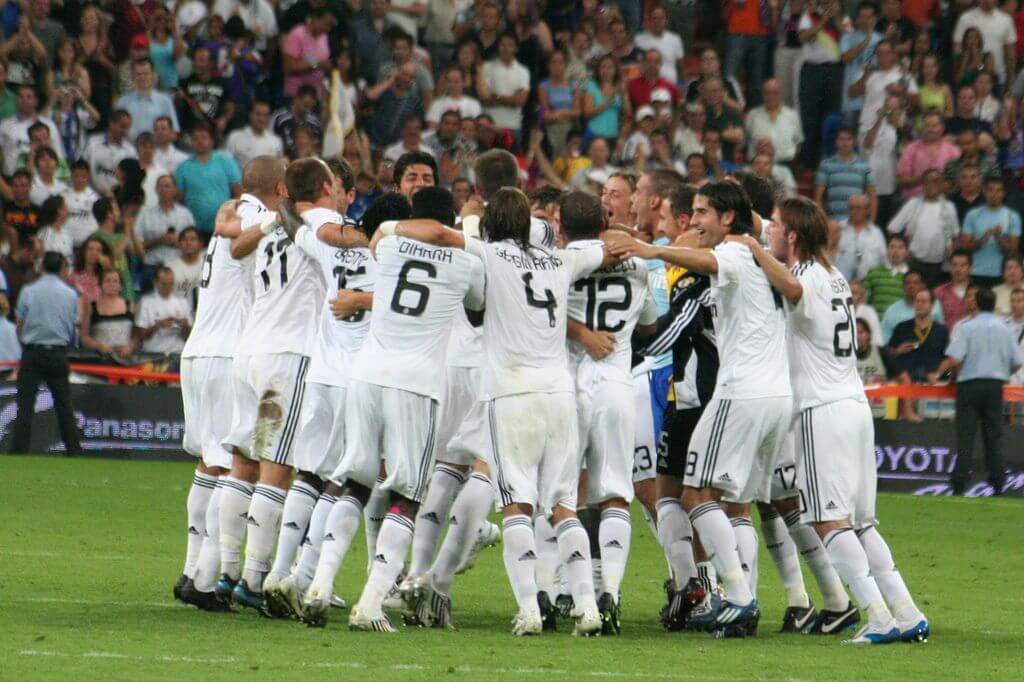
FOOTBALL is by far the world’s best loved sport and with four billion people hooked it was only a matter of time before the world of crypto converged on the fan driven market.
A recent partnership between crypto firm Cashbet and London based Arsenal FC has already started gathering pace.
Now one enterprising London firm is set to transform the sector entirely with a ground-breaking ICO that will allow fans a brand new way to support their favourite clubs while at the same time having the potential to stake ownership.
BlocSide Sports LTD and MVP a sports franchise-backed token on the Ethereum blockchain aim to completely transform the way fans interact with their favourite teams.
MVP, a popular baseball acronym which translates to ‘Most Valuable Player’, can be used to purchase team merchandise and tickets, fund player transfers, and, ultimately as the market develops, purchase a FIFA soccer team.
The first token in professional football
Blocside CEO Daniel Taylor is an expert on bitcoin, blockchain and all things crypto.
The New York City-based entrepreneur spoke with Cointext.com exclusively on his new venture in a bid to explain how his ambitious plans are already set to change fan experience for the better.
And he says that his passion for football or soccer as it’s known in the US helped him to develop the idea.
He said: “After University, I played pro soccer in Sweden and Greece.
https://www.youtube.com/watch?v=mewi5hIrzuM
“Up to that point, the majority of my professional experience was in finance, specifically at Goldman Sachs and Brightwood Capital, a mezzanine private equity firm.
“Whilst playing, I leveraged my passion for business, and my infatuation for technology to start two companies, Tipster and Only4stars.
“Tipster is an IOS App and Web Widget that delivers personalized style advice from vetted influencers in real time and was acquired in April 2017.
“Only4stars is a global football and marketing agency that specializes in developing talent from emerging markets of football.
“I’ve been an active participant in the crypto revolution for many years so it was a natural step to try and marry two passions.

“The current climate in football of financial corruption hit close to home as many players experience broken promises and dodgy payment systems.
“We believe there is a better way through transparency and accountability.
“MVP is the first digital token within professional football.
“MVP Token’s mission is to create a transparent financial infrastructure capable of supporting the growth and evolution of digital currencies within the $40+billion professional football economy.”
Blockchain can help to fight corruption
What’s exciting about MVP is it aims to bring a level of transparency to a sport that has been embroiled in corruption claims for almost three years.
FIFA, the industry’s world governing body, became dogged by claims of widespread corruption, when the US Department of Justice indicted several top executives in summer 2015.
Since then two of the most powerful men in football, the organisation’s President Sepp Blatter and UEFA President Michel Platini, were banned for eight years from all football-related activities by the organisation’s ethics committee.
Meanwhile a Swiss criminal investigation sparked subsequent arrests and triggered investigations in Australia, Colombia, Costa Rica and Germany.

That embarrassing stain on the sport which is beloved by billions, has opened the door to calls for transparency, which is exactly what Mr Taylor is betting on as his idea of looking into a crypto-backed team gathers momentum.
He added: “The unfortunate reality of the industry is that corruption does exist.
“While FIFA is doing all they can to encourage financial fair play, the system does not lead to transparency from an ownership transaction perspective.
“Clubs receive sponsorship, broadcasting, merchandise sales, tickets sales, and transfer fee revenue in different currencies, and at each exchange/transaction point, the club loses money in transaction fees.
“Payment delays are rampant throughout the industry which leads to a lack of trust in the system.”
A tangible solution for troubled clubs?

Football clubs in the UK and beyond have also been dogged with financial issues like Rangers FC in Scotland whose fans stepped into save the club after a rogue deal led to major losses.
Rangers, who have a worldwide following, are still struggling to raise the necessary funds to keep the team afloat – but a crypto solution could be exactly what the doctor ordered to turn the fortunes of the 146-year-old club around.
The team, known as the Teddy Bears, has a global fan base of more than 8 million supporters, meaning the appetite for them and other clubs to explore fintech could well and truly be out there.
“An investment in a team would give us a proving ground for both sides of our business,” said Mr Taylor.
“On the football side, it would give us a starting place to get our younger players experience on the pitch away from home.

“On the blockchain side, or BlocSide, which is the new name for our company, it allows us a place to beta test our token technology in a real world environment.
“If our hypothesis of increased transparency, reduced costs and giving fans a stake proves successful, that’s a story we can take to all football clubs, leagues and associations.
“So far the feedback has been amazing. Many clubs are forward thinking and I don’t think it will be a surprise if we end up involved with one of those first.
“As a football agency, we have found that there are many financial and operational inefficiencies within the industry.
“Football is an ecosystem in itself, that does not operate as a by-product of any single economy, but rather has ties to a diversity of countries, currencies, capital flows, and football market dynamics.
“The by-product of this structure is an inefficient system in terms of conducting business.”
The future of player’s pay
MVP is not solely backed by the idea of investment but the theory also extends itself into payroll.
The idea of footballers taking their gargantuan pay cheques home in the form of digital currency may be far fetched at the moment but it has the potential of opening up a world of opportunities for fans – even to pay their favourite players a bonus should they knock it out the ballpark in a season.

Last month a tiny sports club in Turkey said it completed the world’s first football transfer using bitcoin.
The amateur team Harunustaspor, who play in the Sakarya First Division Group B, brought 22-year-old Omar Faruk Kiroglu on its books using the cryptocurrency.
Kiroglu received 0.0524 in bitcoin (approximately £385) and 2,500 Turkish Lira (£470) as part of the deal.
And while that is positively tiny in relation to the large paycheques demanded by the biggest players in the game – it signals that it’s not only possible but doable.
No limit on success
Mr Taylor says that feedback thus far on his idea has more than a sporting chance of success and that if the model works for football then there’s no limit to how it can be applied to other areas.
He continued: “The majority of our feedback has come from crypto world.
“These early adopters see football as a very sexy and lucrative space to apply blockchain technology.
“The footballers take a bit more convincing, but once we give them a crypto crash course and explain our plan, it’s easy for them to see the benefits both personally and to the game itself.”
What’s also great is that a completely fresh approach to finance could help teams cut costs in the long term and MVP are already in talks with clubs and ticket vendors.

And while it’s very early days crypto and sport could well end up being one of the great stories to emerge from this market making it a win win for everyone involved.
“The ref has blown his whistle and it’s game on,” added Mr Taylor, “but we’re only in the first 10 minutes.
“Just like the internet revolution and mobile after that, there will be winners and losers. Football fans wouldn’t want it any other way.”

